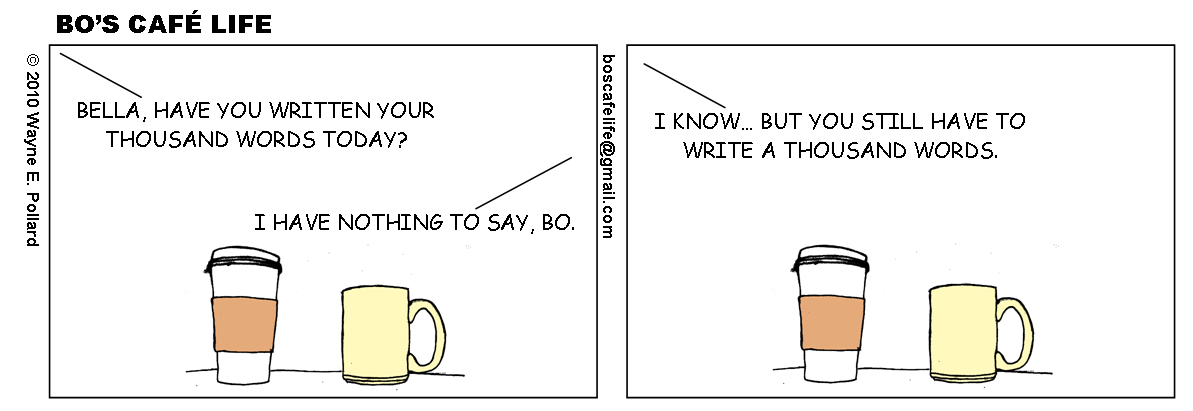
One of my few rules about writing is that it should be fun. There are a lot of far more lucrative ways to torture yourself. If you’re not having fun, there’s a good chance your readers won’t be, either.
But as with anything, there are ups and downs. Somedays the words pour out of your soul like magic, others they drip like tar, every other one stinging like a criticism. And sometimes they come easily, but tear your heart out as they come, laden with years of repressed emotion. So while the over-all thrust of your writing endeavor should be enjoyable, or at the very least meaningful, there are times when you’ll need to push yourself past the challenges.
For this, we have word count.
I should start by saying that I have long been skeptical of setting a word-count goal for a period of drafting. For the first ten years or so I wrote without even thinking about such things. When I started meeting other writers and realized that some of them put some stock in how many words they’d drafted in a given period, I scoffed. True art needs no measure or something like that.
But as I started to realize that I needed to be more productive in order to write what I wanted to write, tracking and planning word productivity has lately become an integral part of my writing process.
Let me start with a cautionary note. It can be easy to turn this kind of focus on production into a form of self-abuse. Everyone writes at a different rate. Some writers produce as much meaning in 500 words as another writer might in 5000 words. The point of tracking your word count production is not to hold yourself up to another writer’s standard, or to feel bad about what your current production rate is, or to put yourself down when you have a slow day, but to give yourself another degree of control over the writing process.
For some writers, the writing period is already finite and precise and you know exactly how long it is. For others, this might require a stopwatch. Start paying attention–without casting judgement–and record how many words you write in a given hour. You’ll probably find that it’s typically the same amount every time you write, with occasional variation. There will probably be slow days where you don’t produce much at all, and flow days where the hours speed by and you finish with a huge amount of words.
If it varies widely, take an average over a period of time, like a week or two, but also keep in mind (or on paper) what a slow day looks like, and what a good day looks like.
Once you have the numbers, there are a few things you can do with them. One is to try to improve them. If your goal is to sell your writing, production is going to be important. Experts are saying that you need to have at least 3-5 books published before you can even consider making a living off your writing. And I’m guessing your time is limited–you need to be able to produce quickly. And, if you’re like me, even if you don’t care about selling your work, you probably have a lot of ideas you want to turn into books.
So, if for example your average words per hour are 1000, try to push yourself to get down 1200 in an hour. Don’t set unreasonable expectations, like going from 1000 to 2000 in a day, but work your way slowly up. As you do this, you might start to notice what some of the obstacles to productivity are and be able to counter them. Maybe you notice you’re more productive in one chair than another, or if you take 5 minute stretch breaks, or working with a particular character, or if you’ve planned the scene you intended to write beforehand.
Or perhaps your issue is different altogether. Maybe you have no trouble producing words but the words you produce aren’t satisfactory; you draft 5000 words in a sitting but when you re-read, it all looks like junk and you spend twice as long on revision. So you’re going to need to work productivity from a different angle. Try lowering your word count. Try saying what you wanted to say in 1000 words, or 500, instead of 5000. Push yourself to leave out unnecessary words, images, dialog, and information while drafting and focus in on the goal of the scene.
Often in this blog series I’ve talked about the methods I’ve learned giving me a greater sense of control over the writing process. This one is no different. Once you start to examine something like word count, a process that seemed unfathomable breaks wide open. When you’re tracking and planning word count, you start to notice what effects it, and those are the parts of writing you can control.
As part of this control, you have a stronger ability to plan things, like how long it will take you to draft your novel. Knowing your output and your time available per day, you can estimate with pretty good accuracy when your draft will be done.
Drafting to a word count has another benefit, this one completely psychological. When you make your goal for the day, it leaves you with a sense of accomplishment. Even if the writing was hard and you’re not sure if the scene you wrote even works, you still made your word count. That’s something to be proud of.
Happy Drafting everyone, and kudos to fellow NaNoWriMoers for beginning this bold endeavor. As I attempt to draft a novel in a month (something I would not have dared without knowing approximately what my current productivity is), I may be scaling back the blog a bit, perhaps to one post a week. Stay tuned for more posts on drafting!

